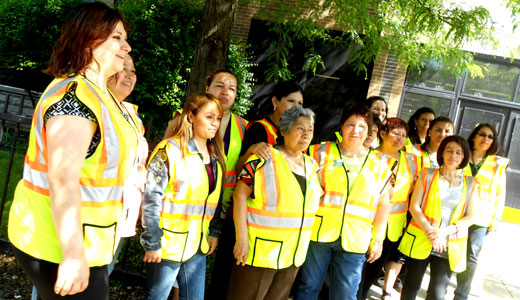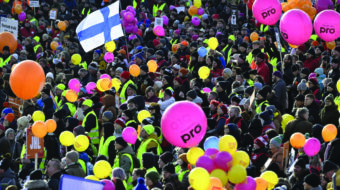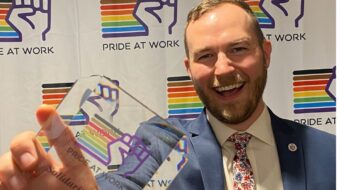
CHICAGO – Except for one grandmother, the rest of the 20 or so women who patrol the streets around Davis Elementary School here every weekday are in their 20s and 30s.
Unlike the police, they earn no salary, carry no weapons and wear no bulletproof vests. But when members of the Latin Kings, the Disciples or Two-Six, the powerful street gangs whose territories converge where the Davis school is located, run into these women, the gang members back off.
They are a voluntary army of mothers who are determined that in a neighborhood where youth fall victim to gang violence almost every day, their children are going to get to and from school safely.
“My child will not be shot, and he is not going to die,” said one of the volunteer moms who has a second grader at Davis.
“With most of the young people out of work, with the lack of jobs, the foreclosures – the gang violence around here is really going up,” said Mariela Estrada who helped pull together not just the women protecting the area around Davis but a volunteer patrol throughout Brighton Park that now totals 150 women.
Asked why the patrollers were all women Estrada said, “the fathers have to work and they go out for some type of work even if they are officially out of a job.
“A ten-year-old was shot a few days ago, shot twice, and a month and a half ago it was a 15 year old shot right here outside Davis,” said Estrada. “And for the last two days now, not a single police patrol has gone by. Our tax dollars are paying to protect NATO. The police have forgotten about us.”
Estrada said the decision to join the moms’ patrol was not easy for the young mothers or the one grandmother at Davis who are part of it. “It often means that only the father can work, provided he has a job, and economically times are so tough that you need everyone who can to be pulling in an income,” she said.
Estrada led the way down the block to where the wall on a corner deli was sprayed with the graffiti signature of the gang Two-Six. The wall was a memorial marking the place and the date that a member of Two-Six had fallen dead in the area’s ongoing street battles.
Around the corner she pointed to a “tagged,” tree, into which a white cloth square had been hammered and onto the trunk of which some gang symbols had been spray-pained. “That ‘s a shrine to a gang member who died right there on the spot,” she said.
“Young people dying all around us,” she said, shaking her head, “because there are no jobs, because of poverty, injustice, foreclosures, lack of immigrant rights – but I’m done crying about it. Now I fight and that’s why we have the patrol.”
As she finished her sentence a member of the Two-Six gang pulled up on his bike, seemingly out of nowhere, demanding to know what was going on. She offered him the chance to be interviewed about one of the shrines painted by his group’s members but he refused. “Tell them they better not take any photos and they better get out of my neighborhood,” he told Estrada as he pulled away on his bike.
Two-Six is one of the largest street gangs in Chicago. Started some 30 years ago in the Little Village neighborhood, the gang has a long rivalry with another group, the Latin Kings.
Gangs operate in the shadows of their neighborhoods, doing a lucrative drug business, among other things, with the older people in charge of the gangs often taking advantage of the younger members through intimidation and fear.
The violence perpetrated against people in the neighborhoods where they operate is often totally senseless. Even youngsters killed accidentally in crossfire meant for another gang can become the cause of new spiraling violence as gangs play a game of one-upmanship to “make good” for that accidental killing in their territory.
“Young people without jobs often join because of the false expectation that they’ll get rich and have power and for a feeling of wanting to belong,” said Estrada.
“We took on this job even though it’s the city’s job,” said Nancy Parazza, another of the guards patrolling closer to the school. “But we have a need at least for a little financing. We have the [uniform] vests that we wear only for 100 of us. The vests, at least are brightly colored so people in cars can see us. It would be nice if we could afford vests for all of us. When gang members see those vests they know to stay away, they know we mean to protect our kids.”
“Where will the city get the money?'” she was asked.
“They are spending millions to protect NATO and with even a tiny bit of that we could do a heck of a lot to help our children keep safe and, if they were really serious, they’d put money in here to create some jobs for our older kids,” Parazza answered.
“But for now, the kids feel safe when they see us,” she said. “They come to us. And the gangs – well they see us and they know to stay away from our kids.”
Asked how she feels about having to live in such a tough neighborhood, Parazza said, “I will never move. Family friends and neighbors here are gentle, warm and loving people. That’s how my community is. We are a people who know how to pull together, how to support one another and how to love one another,” she said as she continued on her late morning rounds as a protector of kids on the streets of Chicago.
Photo: Volunteer mom guuards pose for a picture in front of Davis elementary school. Blake Deppe/PW












Comments